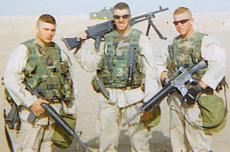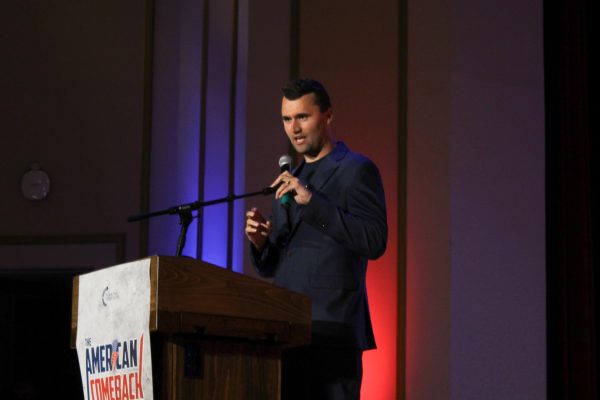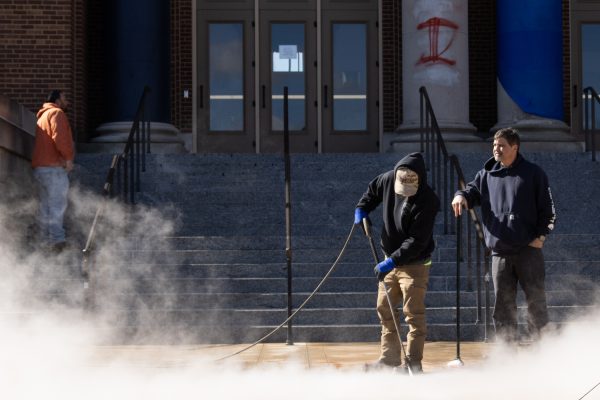Student soldier reminisces about Iraq

Photo courtesy of Dan Rhodes
September 21, 2004
Daniel Rhodes has been fascinated with the military since kindergarten.
“I love the uniforms. I love the camouflage … so I think that it suited me well,” Rhodes said.
Rhodes entered the University in 1999 and joined the Naval ROTC. But Rhodes said he felt he was “floating around” so he entered the Marine Corps Reserve after two years, seeking the discipline of an enlisted life.
“Boot camp turns boys into men,” he said.
Later, Rhodes attended combat engineering school in North Carolina.
Get The Daily Illini in your inbox!
Rhodes re-enrolled at the University in the fall of 2002, but received a three-day notice for deployment in January 2003.
He was deployed to Kuwait within a month.
His company, Charlie Company 6th Engineers, was part of Operation Iraqi Freedom and supported the 1st Marine Expeditionary Force.
“I was apprehensive at first because I didn’t know what he was going to do be doing,” said Ethan Wautelet, Rhodes’s friend of four years. But Wautelet said he knew Rhodes wanted to serve and supported him through letters.
“I was ready. Marines train to go to combat … That’s where my focus was,” Rhodes said.
He also supported the decision to enter Iraq.
“What Saddam Hussein was doing was pretty bad. I mean, not for everybody. Some people had it good. Some people had it bad. But some of the atrocities he was doing – killing the Iraqis in northern Iraq, dumping acid on them from helicopters – they were doing some pretty bad things. So it was necessary for us to go in there.”
As Iraqi rockets retaliated against the U.S. attacks, Rhodes watched from a hole in the ground.
“I didn’t think it was real. It was more like shock,” he said.
Rhodes’s company protected transportation routes and prepared the way for the rest of the military.
But one particularly dangerous incident stuck out in his mind.
“There was a mine lodged in the ground,” Rhodes recalled. “It was alive and broken. It was exposed and very unstable. It was lodged next to a fuel line, which was pumping hundreds of thousands of gallons of fuel.”
Rhodes said the fuel line was important because without it, the trucks wouldn’t have enough fuel to travel to northern Iraq.
“We had to take a grappling hook and actually hook the mine, then just walk back 20 feet with the rope and yank it out of the ground,” he said. ” You’re just praying that as you’re tugging at the rope that your leg won’t blow off.”
Traveling through the region, the company sometimes encountered Iraqis. Some would ask for food and water, but others were hostile.
Rhodes said the sentiments varied by region.
“In southern Iraq, they wanted us there. Up near Baghdad, they didn’t like us because Saddam was taking care of them,” Rhodes said.
The men rode trucks piled with hundreds of pounds of plastic explosives, rounds of ammunition, high explosives and 50 caliber machine guns. Oftentimes, they were sitting directly atop the explosives.
“We were sitting on a nightmare,” Rhodes said.
During his time in Iraq, Rhodes rediscovered his faith in God.
“There’s that old saying that there’s no such thing as an atheist in a fox hole or a fighting hole,” Rhodes said. “You don’t realize how much of an issue your faith is until it’s critical.”
Many times they talked about God and what would happen if someone died the next day.
“I went to church with a gas mask,” Rhodes said. “I went to church with a rifle. We’re sitting in the middle of the Iraqi desert singing praise songs. But to have that break in the week is amazing. Everybody just pours their heart out. That was probably one of the most amazing things I’ve seen,” he said. “I even saw a Marine be baptized in a tank that’s used to clean yourself off during a chemical weapons attack.”
As the days went on, they had no idea when they would return home. Everyday, they hoped to board the flight back to the United States.
Finally, Rhodes returned to the United States in June 2003 and was back in school by August.
Although Rhodes said the transition to civilian life was fairly easy, there were still some major adjustments. He and his fellow Marines had depended on each other for their lives, but once they returned, they parted ways.
Opposition to the war was difficult for Rhodes to deal with.
“What that (opposition to the war) gets interpreted as in our minds is, ‘What you did for the war was all in vain,'” he said.
Dana Padgen, Rhodes’s cousin, was thrilled when he returned.
“His outlook on life changed. But deep down, he was the same guy that I knew,” she said. “He’s a goofball. He’s funny. He’s caring and sympathetic. He’s a great listener. But he’s able to be a soldier when he needs to. He’s unbelievably strong.”
One of Rhodes’s best friends, Natalie Villardito, said she thinks he is better at school now and more focused.
“He’s very military-minded,” Villardito said. “He’s the nicest person I’ve ever met in the world. He’s one of those friends that would do anything, anytime and anywhere for you. He’s the best friend anyone could ask for.”
Rhodes will graduate with a political science degree this year. Upon graduation, he expects to become a lieutenant in the Marine Corps.
“I love being a Marine,” Rhodes explained. “That’s my passion. I love being around Marines. I love everything about it. As frustrating as it is, as terrible as it is, and as miserable as we were, I’d rather be doing that than going to college classes. I think you appreciate life more when you have the possibility that you won’t have it the next day.”





